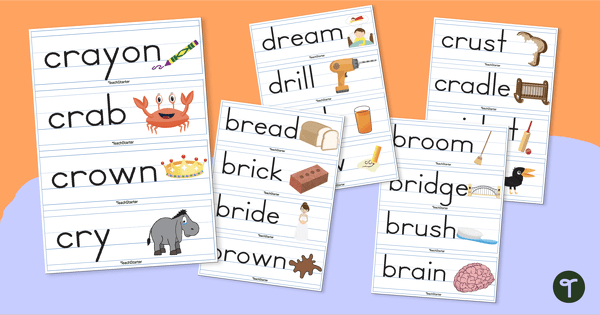Developing a spelling program is not about students learning a list of words at home and taking a spelling test every Friday to determine how much they have managed to rote learn. Spelling is more than learning words…it’s learning about words (Bush, 2008). Learning about words and how to spell them is not done in one exposure and that’s it! It’s about multiple, meaningful exposures to the English language.
Developing a spelling program that focuses on spelling strategies and spelling awareness is a crucial element to the development of students spelling skills. This blog article will identify just one idea of how to develop a spelling program in your classroom. If you have any other ideas or suggestions, we would love to hear about them in the comments section of this blog article.
Determining each student’s developmental stage is crucial to the planning of a spelling program. This allows children to be allocated word lists, spelling activities and support, tailored to their needs. In my classroom, I used draft writing and specifically designed spelling tests such as Words Their Way, to determine each student’s spelling abilities and their awareness of phonemes, rules, conventions, structure and their logic of the English language.
I found for the early years, focusing on one particular phoneme a week and the different ways to spell that phoneme was a great way to ‘teach’ spelling. At the beginning of the week students were given a suitable word list catered to their spelling ability. This was not sent home. This was purely the words that we would use to learn about a particular phoneme through activities and writing tasks. For example, one week we may have focused on the phoneme (oi/oy). The spelling list would be:
- toy
- coin
- oil
- joy
- noise (lower ability – stopped here)
- boy
- join
- enjoy
- voice
- soil (next level up – stopped here)
- choice
- spoilt
- destroy
- oyster
- annoy (extension words for children who required extension)
For children with a lower ability, they would focus on the first 5 words, the next level up would focus on 10 words. To extend the higher ability students, they would receive a list of 5 extension words. These words generally linked to the same phoneme but with more complex spelling patterns. Alternatively, these words could be topic related words. For older grades, you may like to focus on bases of words, prefixes, suffixes and phonemes with words that have more complex spelling patterns.
Once each student was provided with their spelling words for the week, I would explicitly teach the spelling pattern and the children would complete a whole class focused activity with their provided spelling words such as a syllable sort, phoneme split, or a word think board. During the week I would use spelling grids, phonics games and activities focusing on the weekly phoneme and list of words. Here is number of resources that could be used during these small group and whole class activities:
Spelling Activity Ideas

teaching resource
Frog Fun Game - Beginning, Middle and Ending sounds
Game cards and instructions for a frog-themed CVC word combination game.

teaching resource
Word Twist – Word Building Game
Encourage word building in your classroom with this fun Boggle-style game!

teaching resource
Consonant Blends Fishbowl Sorting Activity
A small group or whole class sorting game to consolidate the learning of beginning consonant blends.
Spelling Posters
Having visual reminders about different phonemes and spelling rules is also a helpful resource for children learning to spell. Here are examples of spelling posters that could be displayed in your classroom:

teaching resource
Spelling Rule Posters – Suffixes and Plurals
Display the common spelling rules for suffixes and plurals with a set of printable spelling rules charts.

teaching resource
Spelling Strategies - Anchor Charts
Remind your students of the different spelling strategies with a set of spelling strategy posters.
I hope that this blog article provides some ideas and activities that could be used in the development of a classroom spelling program.
It is crucial that spelling programs are adapted to suit the ability of each individual class, that is, a differentiated program to ensure all spelling abilities are catered for.
Remember, the program should focus on teaching children about words, the different spelling strategies and ensuring multiple, meaningful exposures to these words in a fun, enjoyable way.


Love this blog. Thank you for highlighting.
No problem Lisbeth! Thank you for your comment! As a teacher I know the struggles of catering for different spelling abilities in the classroom environment!! Kind regards Holly